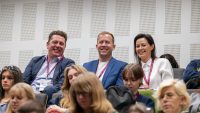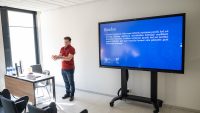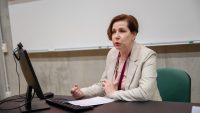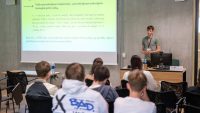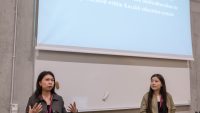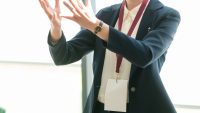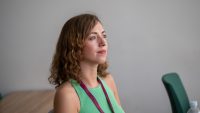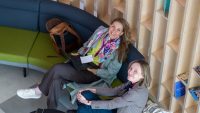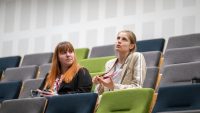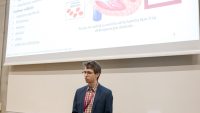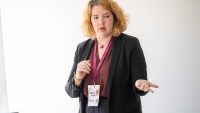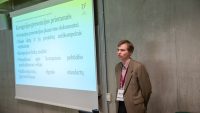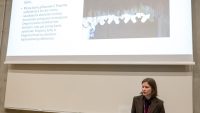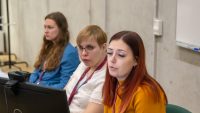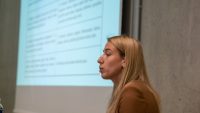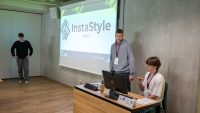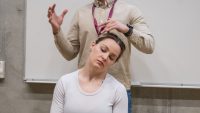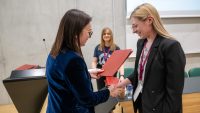Geneticist Žemaitis: Creative Freedom Is My Takeaway from University

VMU Rector Prof. Juozas Augutis and dr. Lukas Žemaitis.
On the first Friday of May, the University hosted the third student conference Freedom to Create. Dedicated to the anniversary of the re-establishment of Vytautas Magnus University (VMU) and to the concept of artes liberales, this year’s event featured nearly sixty presentations – the largest number yet – by VMU students and schoolchildren from VMU partner gymnasiums.
Active, responsible, and free to create
From artificial intelligence to stress management, from female conductors to rowing, from cancer treatment to rural architecture, and from politics to children’s games, this year’s Freedom to Create conference clearly showcased VMU’s broad educational opportunities and the influence of the liberal arts on the academic process.
“This year the University is celebrating the liberal arts and the 35th anniversary of its re-establishment, so this conference is the culmination of all our anniversary events. It feels great just to come here, hear each other, and share ideas. The large number of participants – students, schoolchildren, and foreign students – and the variety of presentation topics at the student conference, which was launched three years ago, prove that liberal arts education contributes to the quality of research and to creativity,” says Simona Pilkienė, VMU Vice-Rector for Studies.

VMU Vice-Rector for Communication Assoc. Prof. Vilma Bijeikienė.
“Today we are talking about how you perceive the liberal arts and what this education means to you,” said Vilma Bijeikienė, VMU Vice-Rector for Communication. “I would like to share a quote by journalist Romas Sakadolskis, which defines it very well: ‘The whole concept of Artes Liberales is founded on what is needed for a person in modern times to fully participate in life. It’s not about what is needed to be a specialist in a field, shutting away in their office to calculate and measure. No. It’s about what is needed to be an active member of society.’ Thus, I think that the main goal of liberal arts education is to be an active member of society. Active, responsible, and free to create. I believe that’s the kind of people who are gathered here,” shares VMU Vice-Rector for Communication.
Creativity pushes towards discovery
The conference featured presentations not only by University students and schoolchildren from partner gymnasiums but also by VMU alumni. Inga Jončienė, a representative of Alliance for Recruitment, shared her insights on the labour market in Lithuania, while geneticist Dr. Lukas Žemaitis delivered a presentation on the links between science and art.

Inga Jončienė, a representative of Alliance for Recruitment.
“I often speak at conferences as a scientist, and lately, even more frequently as an entrepreneur, but today I will try to speak as a creator,” said Dr. Žemaitis, who revealed that he took his creative freedom from his studies at VMU and his participation in the University’s scientific society Modusas, which was precisely what opened his eyes.
“What is fascinating about creativity, which exists in science and inevitably in art, is that there are no boundaries. You need to provoke, to seek new forms, and sometimes to break and shake up the rules. All this is what pushes us towards further discoveries,” says the renowned geneticist.

„Genomika“ co-founder dr. Lukas Žemaitis.
After founding the company Genomika together with VMU doctoral student Ignas Galminas, the scientists gained recognition by encoding the Lithuanian national anthem into a DNA molecule, and later, the most famous photographs of M.K. Čiurlionis’ works. Currently, along with seven international partners, Genomika is working to create the first liquid disc that will make it easy for individuals with no genetic knowledge and no knowledge of analytical tools to access the DNA storage.
“I believe that innovation can be created by attempting to combine fields that already work separately but haven’t yet been brought together. Elon Musk didn’t invent the electric car: there were already bodies, electric motors, and batteries. Put everything that works together in one place, and you might just create something completely new. We apply the same ideology in our start-up,” the scientist explains, noting that creating something from nothing would be very challenging.
Having a goal is key
The conference concluded with a discussion between Aušra Lisinskienė, Associate Professor at VMU Education Academy, and Sergej Maslobojev, world kickboxing champion and student at VMU Education Academy, titled “How to Achieve Your Goals? What to Be and What Not to Be? How to Discover the Best Version of Yourself?”
Athlete Sergej Maslobojev, a student at VMU Education Academy, shared his difficult path to success, which included failures and disappointments: “I was afraid to be myself, I was afraid to be a personality. Am I proud of that? Certainly not, I’ve made all kinds of mess. Am I grateful to the sport for giving me direction? Absolutely. I think a person without a goal is just a vegetable.”

Sergej Maslobojev and Assoc. Prof. Aušra Lisinskienė.
According to him, the biggest obstacle to achieving your goals is the fear of making mistakes. “I’ve never been afraid of an opponent or of pain, but I was afraid of making a mistake, of the unknown. Why don’t we usually start doing what we want? Because most of the time, the inner voice says it won’t work,” says the world champion, adding that even though you feel fear and lack self-confidence, you have to pursue your goal in small steps and see what comes of it. “But to do that, my dear friends, you have to at least know where you want to go,” Maslobojev emphasised repeatedly in his speech.
The conference concluded with a musical performance by Liepa Dabriškaitė and Ugnė Stražnickaitė, students of VMU Music Academy, and the awarding of scholarships to students for their academic and artistic achievements. At the end of the event, the conference presentation that garnered the most audience votes was also awarded. This was the presentation “Study of the Effect of Honey on the Development of Mould Fungi” by Samanta Maslenskytė and Ugnė Bebrauskaitė from Kaunas Steponas Darius and Stasys Girėnas Gymnasium.





